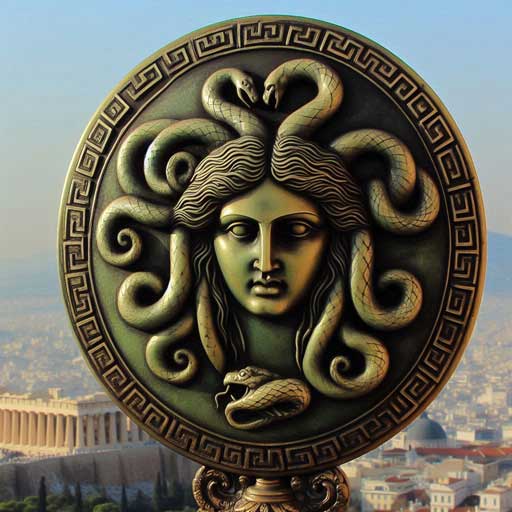Medusa, one of the most fascinating figures in Greek mythology, has captivated the imaginations of storytellers and artists for centuries. Known for her hair of living snakes and a gaze that could turn onlookers to stone, Medusa's story is both tragic and intriguing. Let's delve into the origins, symbolism, and enduring legacy of this enigmatic Gorgon.
Table of Contents
- Origins and Transformation
- Perseus and Medusa
- Symbolism and Interpretation
- Medusa in Art and Culture
- The Legacy of Medusa
- Conclusion
Origins and Transformation
Medusa wasn't always the monstrous figure we envision today. According to early myths, Medusa was originally a beautiful maiden, one of the three Gorgon sisters born to the sea deities Phorcys and Ceto. Unlike her immortal sisters, Stheno and Euryale, Medusa was mortal. Her transformation from a ravishing beauty to a feared monster is a tale of divine punishment and tragedy.
The most popular version of Medusa's transformation involves the god Poseidon. Medusa caught the eye of Poseidon, who desired her and, depending on the version of the myth, either seduced or assaulted her in the temple of Athena. Enraged by the desecration of her sacred space, Athena transformed Medusa's beautiful hair into venomous snakes and cursed her with a gaze that turned any who looked upon her to stone.
Perseus and Medusa
Perseus, one of Greek mythology's greatest heroes, was tasked with an almost impossible mission: to slay Medusa. Armed with gifts from the gods, including Hermes' winged sandals, Hades' helm of invisibility, and Athena's reflective shield, Perseus set out to confront the Gorgon. By using the shield to view Medusa's reflection and avoid her petrifying gaze, he was able to decapitate her. From Medusa's severed neck sprang the winged horse Pegasus and the giant Chrysaor, illustrating the paradox of creation emerging from destruction. Perseus' triumph over Medusa symbolizes the victory of courage and cleverness over monstrous terror.

Symbolism and Interpretation
Medusa's story is rich with symbolism and has been interpreted in various ways throughout history.
Patriarchal Punishment
Some view Medusa's transformation as a punishment not just for her, but as a reflection of the ancient patriarchal society where women often bore the brunt of blame for male transgressions. Athena's harsh punishment can be seen as an example of victim-blaming.
Protection and Power
Despite her monstrous appearance, Medusa's image was often used as a protective symbol. Her visage adorned shields, armor, and buildings, intended to ward off evil and protect against harm. This duality of Medusa as both a monster and a guardian highlights the complexity of her character.
Feminine Rage
In feminist interpretations, Medusa represents the rage and power of a woman wronged. Her ability to turn men to stone can be seen as a metaphor for the fear of feminine power in a male-dominated world.

Medusa in Art and Culture
Medusa's story has inspired countless works of art, literature, and popular culture. From ancient Greek pottery to Renaissance paintings and modern films, her image is iconic.
Classical Art
In ancient Greece, Medusa was often depicted in pottery and sculptures. The famous "Medusa Rondanini" sculpture from the 5th century BC shows her with a more serene and beautiful face, reflecting her dual nature.
Renaissance
Artists like Caravaggio and Leonardo da Vinci reimagined Medusa in their works. Caravaggio's painting, "Medusa," captures the horror and pain of her transformation, with her decapitated head still bearing an expression of agony.
Modern Interpretations
In contemporary culture, Medusa appears in various media, from movies like "Clash of the Titans" to books and video games. She continues to be a symbol of both beauty and terror, reflecting ongoing societal themes and fears.
The Legacy of Medusa
Medusa's tale is more than just a myth; it's a narrative that explores themes of beauty, power, victimization, and transformation. Her story serves as a reminder of the complexities of ancient myths and their ability to convey profound truths about human nature and societal values.
Medusa's enduring legacy lies in her ability to evoke both fear and sympathy. She remains a powerful figure in mythology, embodying the consequences of divine wrath and the resilience of the human (or, in her case, monstrous) spirit.

Conclusion
Medusa's story is a testament to the rich tapestry of Greek mythology, where gods and mortals, beauty and monstrosity, punishment and protection intertwine. As we continue to explore and reinterpret her tale, Medusa will undoubtedly remain a figure of endless fascination and profound symbolism.
Interested in Greek Mythology ? Visit our blog here


